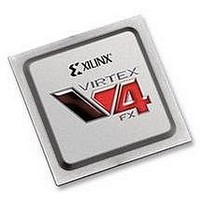XC4VFX20-10FFG672C Xilinx Inc, XC4VFX20-10FFG672C Datasheet - Page 304

XC4VFX20-10FFG672C
Manufacturer Part Number
XC4VFX20-10FFG672C
Description
IC FPGA VIRTEX-4 FX 20K 672-FBGA
Manufacturer
Xilinx Inc
Series
Virtex™-4r
Datasheets
1.XC4VFX12-10FFG668C.pdf
(58 pages)
2.XC4VFX12-10FFG668C.pdf
(9 pages)
3.XC4VFX12-10FFG668C.pdf
(406 pages)
Specifications of XC4VFX20-10FFG672C
Total Ram Bits
1253376
Number Of Logic Elements/cells
19224
Number Of Labs/clbs
2136
Number Of I /o
320
Voltage - Supply
1.14 V ~ 1.26 V
Mounting Type
Surface Mount
Operating Temperature
0°C ~ 85°C
Package / Case
672-BBGA, FCBGA
No. Of Logic Blocks
19224
No. Of Macrocells
19224
No. Of Speed Grades
10
No. Of I/o's
320
Clock Management
DCM
I/o Supply Voltage
3.45V
Lead Free Status / RoHS Status
Lead free / RoHS Compliant
For Use With
HW-V4-ML405-UNI-G - EVALUATION PLATFORM VIRTEX-4
Number Of Gates
-
Lead Free Status / RoHS Status
Lead free / RoHS Compliant, Lead free / RoHS Compliant
Available stocks
Company
Part Number
Manufacturer
Quantity
Price
Company:
Part Number:
XC4VFX20-10FFG672C
Manufacturer:
ADVANTEK
Quantity:
314
Company:
Part Number:
XC4VFX20-10FFG672C
Manufacturer:
XilinxInc
Quantity:
3 000
Company:
Part Number:
XC4VFX20-10FFG672C
Manufacturer:
Xilinx Inc
Quantity:
10 000
Part Number:
XC4VFX20-10FFG672C
Manufacturer:
XILINX/赛灵思
Quantity:
20 000
- XC4VFX12-10FFG668C PDF datasheet
- XC4VFX12-10FFG668C PDF datasheet #2
- XC4VFX12-10FFG668C PDF datasheet #3
- Current page: 304 of 406
- Download datasheet (6Mb)
Chapter 6: SelectIO Resources
304
Table 6-39: Absolute Maximum Undershoot and Overshoot
The clamp diodes offer protection against transient voltage beyond approximately
V
the current going through it. Therefore the clamped level is not fixed and can vary
depending on the board design. The absolute maximum I/O limits might be exceeded
even if the clamp diode is active.
The IBIS models contain the voltage-current characteristics of the I/O drivers and clamp
diodes.
To verify overshoot and undershoot are within the I/O absolute maximum specifications,
Xilinx recommends proper I/O termination and performing IBIS simulation.
Source Termination and LVDCI_33
In general, the I/O drivers should match the board trace impedance to within ±10% to
minimize overshoot and undershoot. Source termination is often used for unidirectional
interfaces. The DCI feature has built-in source termination on all user output pins. It
compensates for impedance changes due to voltage and/or temperature fluctuations, and
can match the reference resistor values. Assuming the reference resistor values are the
same as the board trace impedance, the output impedance of the driver will closely match
with the board trace.
The LVDCI_33 standard is used to enable the DCI features for 3.3V I/O operations. As
shown in
termination function in Virtex-4 FPGA output drivers. The pull-up resistor connected to
VRN and the pull-down resistor connected to VRP determine the output impedance of all
the output drivers in the same bank. The
(DCI)”
Since the LVDCI_33 standard does not offer input termination, source termination must be
implemented on the driver side.
termination resistors to be incorporated on the external device side.
CCO
+ 0.5V and Ground – 0.5V. The voltage across the diode increases proportionally to
section has more details on using DCI.
Figure
V
CCO
3.75
3.45
3.6
3.3
3.0
(V)
6-79, the OBUF_LVDCI_33 primitive is used to implement the source
www.xilinx.com
Maximum Undershoot (V)
Figure 6-79
“Virtex-4 FPGA Digitally Controlled Impedance
–0.30
–0.45
–0.60
–0.75
–1.05
shows the recommended external source
UG070 (v2.6) December 1, 2008
Maximum Overshoot (V)
Virtex-4 FPGA User Guide
4.05
4.05
4.05
4.05
4.05
R
Related parts for XC4VFX20-10FFG672C
Image
Part Number
Description
Manufacturer
Datasheet
Request
R

Part Number:
Description:
IC FPGA VIRTEX-4 FX 20K 672-FBGA
Manufacturer:
Xilinx Inc
Datasheet:

Part Number:
Description:
IC FPGA VIRTEX-4 FX 20K 672-FBGA
Manufacturer:
Xilinx Inc
Datasheet:

Part Number:
Description:
IC FPGA VIRTEX-4FX 672FFBGA
Manufacturer:
Xilinx Inc
Datasheet:

Part Number:
Description:
IC FPGA VIRTEX-4 FX 20K 672-FBGA
Manufacturer:
Xilinx Inc
Datasheet:

Part Number:
Description:
IC FPGA VIRTEX-4FX 672FFBGA
Manufacturer:
Xilinx Inc
Datasheet:

Part Number:
Description:
DC and Switching Characteristics
Manufacturer:
XILINX [Xilinx, Inc]
Datasheet:

Part Number:
Description:
IC CPLD .8K 36MCELL 44-VQFP
Manufacturer:
Xilinx Inc
Datasheet:

Part Number:
Description:
IC CPLD 72MCRCELL 10NS 44VQFP
Manufacturer:
Xilinx Inc
Datasheet:

Part Number:
Description:
IC CPLD 1.6K 72MCELL 64-VQFP
Manufacturer:
Xilinx Inc
Datasheet:

Part Number:
Description:
IC CR-II CPLD 64MCELL 44-VQFP
Manufacturer:
Xilinx Inc
Datasheet:

Part Number:
Description:
IC CPLD 1.6K 72MCELL 100-TQFP
Manufacturer:
Xilinx Inc
Datasheet:

Part Number:
Description:
IC CR-II CPLD 64MCELL 56-BGA
Manufacturer:
Xilinx Inc
Datasheet:

Part Number:
Description:
IC CPLD 72MCRCELL 7.5NS 44VQFP
Manufacturer:
Xilinx Inc
Datasheet:

Part Number:
Description:
IC CR-II CPLD 64MCELL 100-VQFP
Manufacturer:
Xilinx Inc
Datasheet:

Part Number:
Description:
IC CPLD 1.6K 72MCELL 100-TQFP
Manufacturer:
Xilinx Inc
Datasheet:











